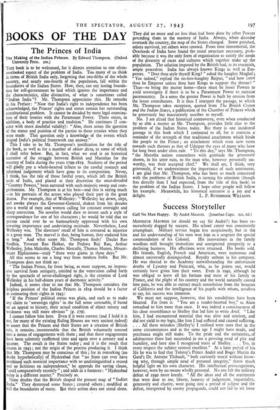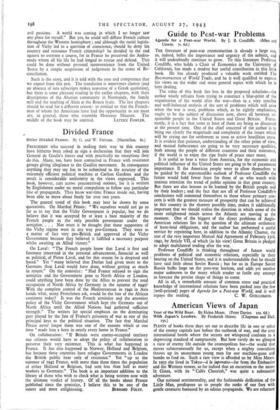Success Storyteller
Call No Man Happy. By Andre Maurois. (Jonathan Cape. 12s. 6c1.1
MONSIEUR MAURO'S (or should we say Sir Andre?) has been re- morselessly dogged by success. His school career was consistently triumphant. Military service began less auspiciously, but in the end his understanding of his men won him as a sergeant the special commendation of his Colonel. His innovations in the family woollens mill brought immediate and unexpected prosperity to a declining business. His affections were returned. His books sold. His friends, English, French and American, were numerous and almost universally distinguished. Royalty unbent in his company. He was elected to the Academy notwithstanding the unfortunate deaths of Lyautey and Poincare, who, as he points out, would certainly have given him their votes. Even in 1940, although he was obliged to leave all his fortune and most of his family in France, and the plight of his country and the world naturally caused him pain, he was able to extract much consolation from the beauties of California and the intelligence of his pupils with whom, needless to say, his success was immense.
We must not suppose, however, that his sensibilities have been blunted. Far from it. " You are a tender-hearted boy," as Alain remarked to him more than once. It was indeed a consciousness of his close resemblance to Shelley that led him to write Arid. " Like him, I had encountered material that was alive and sentient, and did not yield to my logic, like him I had suffered and caused suffering. . . . All these mistakes (Shelley's) I realised were ones that in the same circumstances and at the same age I might have made, and perchance might still make. To the pride and the certainties, of adolescence there had succeeded in me a pressing need of pity and humility, and here also I recognised traits of Shelley. . . . Yes, in every respect the subject seemed excellent." At a later period of his life he was to find that Tolstoy's Prince Andre and Roger Martin du Gard's Dr. Antoine Thibault, " both curiously moral without know- ing why, through simple need of personal integrity," threw much helpful light on his own character. His intellectual preoccupations, however, were by no means wholly personal. No one felt the military defeat of 1940 more keenly. "All the ideas and all the sentiments that were dear to me, liberty, honesty of judgement, impartiality, generosity and charity, were going into a period of eclipse and the defeat, interpreted by enemy propaganda, could not fail to set loose
evil passions. A world was coming in which I no longer saw any place for myself." But yes, he could still diffuse French culture throughout the Western hemisphere ; and although the racial legisla- tion of Vichy led to a question of conscience, should he deny his country and renounce French citizenship? he decided in the end against so extreme a course, for in France he perceived the Andro- meda whom all his life he had longed to rescue and defend. This could be done without personal inconvenience from the United States by a simple suspension of judgement in the name of Re- conciliation.
Such is the story, and it is told with the ease and competence that we expect from this pen. The translation is sometimes clumsy (and an absence of iota subscripts makes nonsense of a Greek quotation), but there is some pleasant reading in the earlier chapters, with their descriptions of the Alsatian community in Normandy, the family mill and the teaching of Alain at the Rouen lycee. The last chapters should be read for a different reason : to remind us that the French- men of whom the Americans have had the opportunity to see most are, in general, those who resemble Monsieur Maurois. The
middle of the book may be omitted. LEITICE FOWLER.























 Previous page
Previous page